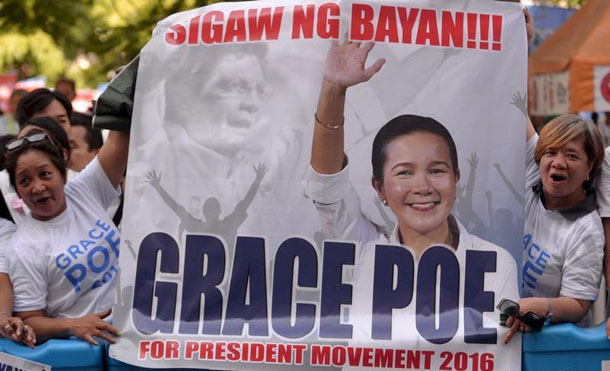MANILA — A Philippine senator abandoned in a church when a baby has widened her lead as the top contender to succeed President Benigno Aquino at elections next May, an opinion poll showed on Friday.
The election will be closely watched by investors, who fear the political succession in one of Asia’s fastest growing economies could derail gains made during Aquino’s rule.
Grace Poe, 47, was the top-rated candidate among 39 percent of respondents in an October survey whose results were published in the Manila Times newspaper, up from 26 percent in a September poll.
Vice President Jejomar Binay came second with 24 percent, a slight increase from 19 percent in September, while Aquino’s choice as successor, former interior minister Manuel Roxas, was third with 21 percent.
Poe, the adopted daughter of a late popular movie action hero, this week defeated a legal bid to unseat her from the Senate because she was not a Philippine citizen, boosting her chance to win other cases seeking to block her presidential run.
The poll result showed people had not been swayed by the negative propaganda against Poe, her spokesman said.
“Instead, the Filipino public decided to focus on the message of good governance, inclusive growth and improving competitiveness of our industries,” Rex Garchalian told broadcaster GMA News.
The result cements Poe’s position as front-runner to become the third woman leader of the poor Southeast Asian state.
Poe was adopted by a popular movie star couple, but her election as a senator was challenged by a losing candidate who queried her citizenship, since her natural parents were unknown.
An electoral tribunal voted to junk the petition on Tuesday.
Aquino, in power since 2010, is barred under the constitution from seeking a second term.
Under his leadership, the Philippines has seen economic growth of more than 6 percent on average, its best five-year record in four decades. He has also battled to rein in corruption.
About 54 million Filipinos will be eligible to vote to choose a president, vice president and more than 18,000 local government executives and lawmakers in the general elections, which take place every six years.

















